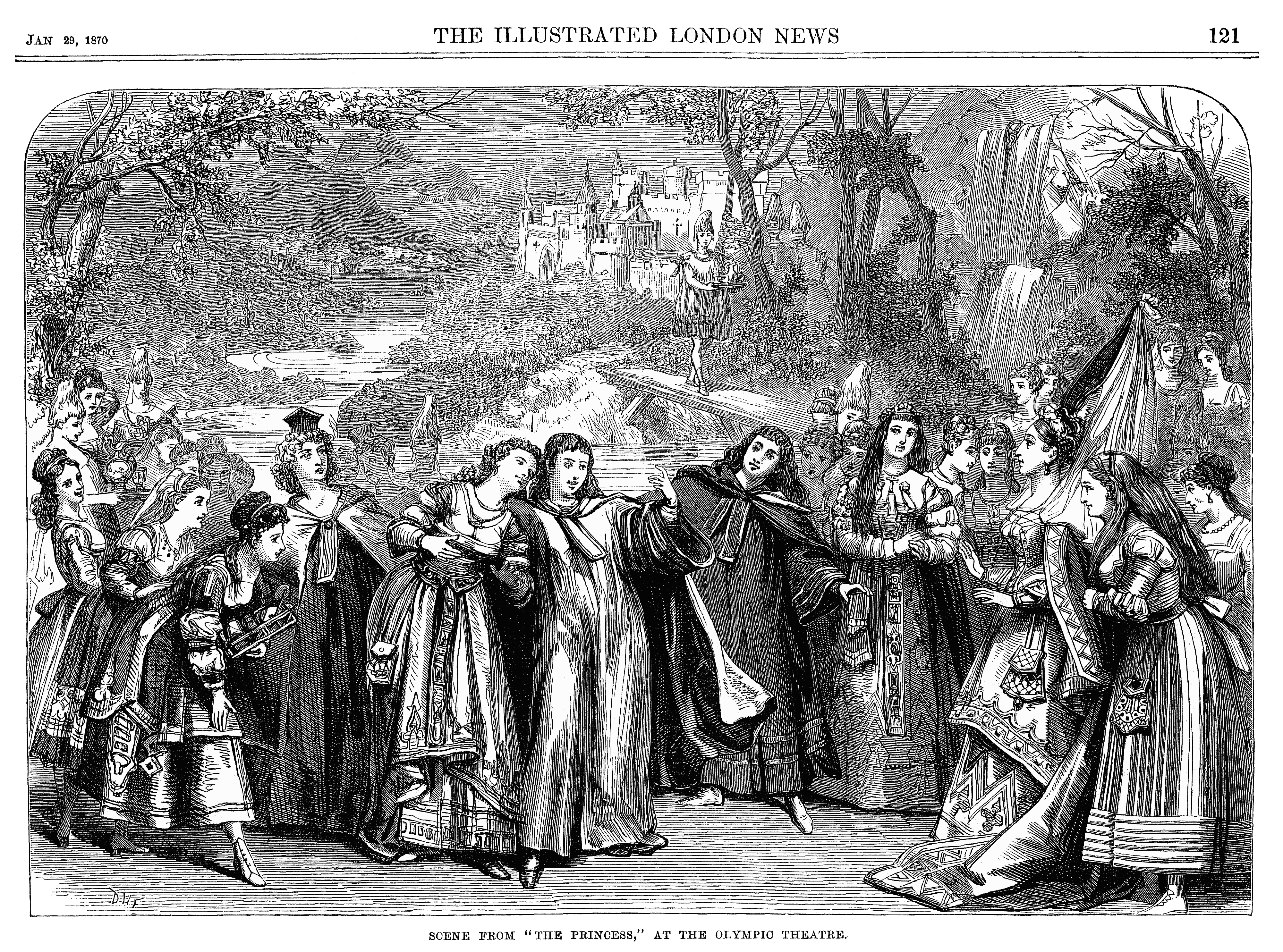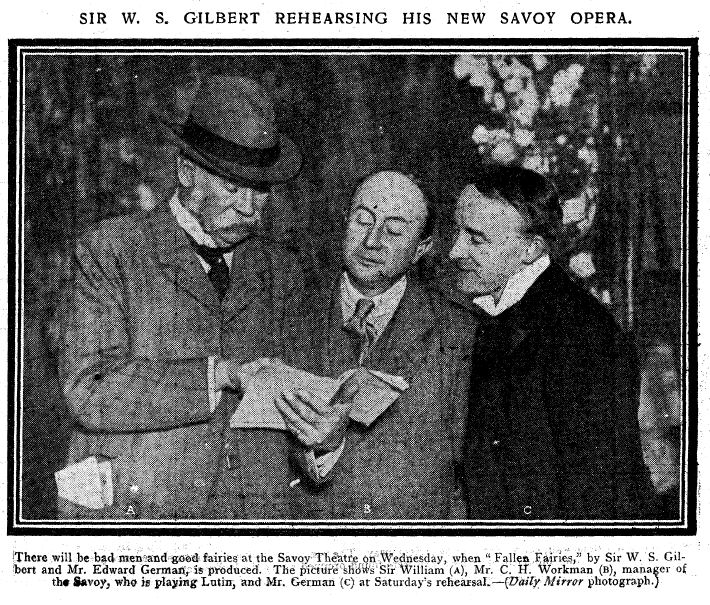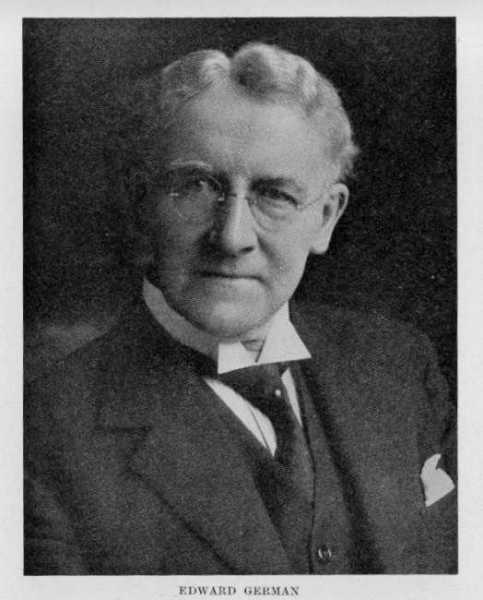|
Leo Sheffield
Leo Sheffield (15 November 1873 – 3 September 1951), born Arthur Leo Wilson, was an English singer and actor best known for his performances in baritone roles of the Savoy Operas with the D'Oyly Carte Opera Company. He made his first stage appearances under the direction of W. S. Gilbert in 1906, remaining with the D'Oyly Carte company for three years. After touring in musical theatre for the next five years with other managements, he rejoined D'Oyly Carte from 1915 to 1928 in the principal baritone roles, appearing in London seasons and on tour in Britain and, in one of his last seasons, Canada. He recorded many of these roles. After leaving D'Oyly Carte, Sheffield worked in a wide variety of theatre, including musical comedy, straight plays, pantomime, and in radio and films. He continued to tour during the Second World War while in his seventies. Life and career Early years Sheffield was born Arthur Leo Wilson [...More Info...] [...Related Items...] OR: [Wikipedia] [Google] [Baidu] |
Leo Sheffield, 1915
Leo or Léo may refer to: Acronyms * Law enforcement officer * Law enforcement organisation * '' Louisville Eccentric Observer'', a free weekly newspaper in Louisville, Kentucky * Michigan Department of Labor and Economic Opportunity Arts and entertainment Music * Leo (band), a Missouri-based rock band that was founded in Cleveland, Ohio * L.E.O. (band), a band by musician Bleu and collaborators Film * ''Leo'' (2000 film), a Spanish film by José Luis Borau * ''Leo'' (2002 film), a British-American drama film * ''Leo'', a 2007 Swedish film by Josef Fares * ''Leo'' (2012 film), a Kenyan film * Leo the Lion (MGM), mascot of the Metro-Goldwyn-Mayer movie studio Television * Leo Awards, a British Columbian television award * "Leo", an episode of ''Being Erica'' * Léo, fictional lion in the animation ''Animal Crackers'' * ''Léo'', 2018 Quebec television series created by Fabien Cloutier Companies * Leo Namibia, former name for the TN Mobile phone network in Namibia * ... [...More Info...] [...Related Items...] OR: [Wikipedia] [Google] [Baidu] |
Princess Ida
''Princess Ida; or, Castle Adamant'' is a comic opera with music by Arthur Sullivan and libretto by W. S. Gilbert. It was their eighth operatic collaboration of fourteen. ''Princess Ida'' opened at the Savoy Theatre on 5 January 1884, for a run of 246 performances. The piece concerns a princess who founds a women's university and teaches that women are superior to men and should rule in their stead. The prince to whom she had been married in infancy sneaks into the university, together with two friends, with the aim of collecting his bride. They disguise themselves as women students, but are discovered, and all soon face a literal war between the sexes. The opera satirizes feminism, women's college, women's education and Charles Darwin, Darwinian evolution, which were controversial topics in conservative Victorian era, Victorian England. ''Princess Ida'' is based on a narrative poem by Alfred, Lord Tennyson called ''The Princess (Tennyson poem), The Princess'' (1847), and Gilb ... [...More Info...] [...Related Items...] OR: [Wikipedia] [Google] [Baidu] |
Twelfth Night
''Twelfth Night'', or ''What You Will'' is a romantic comedy by William Shakespeare, believed to have been written around 1601–1602 as a Twelfth Night's entertainment for the close of the Christmas season. The play centres on the twins Viola and Sebastian, who are separated in a shipwreck. Viola (who is disguised as Cesario) falls in love with the Duke Orsino, who in turn is in love with Countess Olivia. Upon meeting Viola, Countess Olivia falls in love with her thinking she is a man. The play expanded on the musical interludes and riotous disorder expected of the occasion, with plot elements drawn from the short story "Of Apollonius and Silla" by Barnabe Rich, based on a story by Matteo Bandello. The first recorded public performance was on 2 February 1602, at Candlemas, the formal end of Christmastide in the year's calendar. The play was not published until its inclusion in the 1623 First Folio. Characters * Viola – a shipwrecked young woman who disguises herself a ... [...More Info...] [...Related Items...] OR: [Wikipedia] [Google] [Baidu] |
The Girl In The Taxi
''The'' () is a grammatical article in English, denoting persons or things already mentioned, under discussion, implied or otherwise presumed familiar to listeners, readers, or speakers. It is the definite article in English. ''The'' is the most frequently used word in the English language; studies and analyses of texts have found it to account for seven percent of all printed English-language words. It is derived from gendered articles in Old English which combined in Middle English and now has a single form used with pronouns of any gender. The word can be used with both singular and plural nouns, and with a noun that starts with any letter. This is different from many other languages, which have different forms of the definite article for different genders or numbers. Pronunciation In most dialects, "the" is pronounced as (with the voiced dental fricative followed by a schwa) when followed by a consonant sound, and as (homophone of pronoun ''thee'') when followed by a v ... [...More Info...] [...Related Items...] OR: [Wikipedia] [Google] [Baidu] |
The Chocolate Soldier
''The Chocolate Soldier'' (German: ''Der tapfere Soldat'' [The courageous soldier] or ''Der Praliné-Soldat'') is an operetta composed in 1908 by Oscar Straus (composer), Oscar Straus based on George Bernard Shaw's 1894 play, ''Arms and the Man''. The German language libretto is by Rudolf Bernauer and . It premiered on 14 November 1908 at the Theater an der Wien. English-language versions were successful on Broadway theatre, Broadway and in London, beginning in 1909. The first film adaptation was in 1915. The The Chocolate Soldier (film), 1941 film of the same name enlists much of Straus's music but is otherwise unrelated, using a plot based on Ferenc Molnár's play ''The Guardsman''. Background When Shaw gave Leopold Jacobson the rights to adapt the play, he provided three conditions: none of Shaw's dialogue, nor any of the character's names, could be used; the libretto must be advertised as a parody; and Shaw would accept no monetary compensation. In spite of this, Shaw's ori ... [...More Info...] [...Related Items...] OR: [Wikipedia] [Google] [Baidu] |
The Manchester Guardian
''The Guardian'' is a British daily newspaper. It was founded in 1821 as ''The Manchester Guardian'', and changed its name in 1959. Along with its sister papers ''The Observer'' and ''The Guardian Weekly'', ''The Guardian'' is part of the Guardian Media Group, owned by the Scott Trust. The trust was created in 1936 to "secure the financial and editorial independence of ''The Guardian'' in perpetuity and to safeguard the journalistic freedom and liberal values of ''The Guardian'' free from commercial or political interference". The trust was converted into a limited company in 2008, with a constitution written so as to maintain for ''The Guardian'' the same protections as were built into the structure of the Scott Trust by its creators. Profits are reinvested in journalism rather than distributed to owners or shareholders. It is considered a newspaper of record in the UK. The editor-in-chief Katharine Viner succeeded Alan Rusbridger in 2015. Since 2018, the paper's main news ... [...More Info...] [...Related Items...] OR: [Wikipedia] [Google] [Baidu] |
The Mountaineers (opera)
''The Mountaineers'' is an English "romantic comic opera" in three acts with a libretto by Guy Eden and Reginald Somerville (1867–1948), lyrics by Eden and music by Somerville. The story concerns Clarice, who challenges her two suitors to retrieve an edelweiss for her from the highest peak. The opera opened at the Savoy Theatre in London on 29 September 1909, under the management of C. H. Workman, and ran for a total of 61 performances, after some additions were made by Arthur Wimperis. It starred Workman, Elsie Spain, Claude Flemming, Jessie Rose and A. Laurence Legge. There was a provincial tour with many of the same cast, under the management of Harry P. Towers in the autumn of 1910.''Penny Illustrated Paper'', 23 April 1910, p. 530; Issue 2552 The second version of the opera was broadcast by the BBC on 24 March and 26 June 1924. Background and productions Richard D'Oyly Carte died in 1901 leaving the management of the D'Oyly Carte Opera Company and the Savoy Theatre in the ... [...More Info...] [...Related Items...] OR: [Wikipedia] [Google] [Baidu] |
The Observer
''The Observer'' is a British newspaper published on Sundays. It is a sister paper to ''The Guardian'' and ''The Guardian Weekly'', whose parent company Guardian Media Group Limited acquired it in 1993. First published in 1791, it is the world's oldest Sunday newspaper. History Origins The first issue, published on 4 December 1791 by W.S. Bourne, was the world's first Sunday newspaper. Believing that the paper would be a means of wealth, Bourne instead soon found himself facing debts of nearly £1,600. Though early editions purported editorial independence, Bourne attempted to cut his losses and sell the title to the government. When this failed, Bourne's brother (a wealthy businessman) made an offer to the government, which also refused to buy the paper but agreed to subsidise it in return for influence over its editorial content. As a result, the paper soon took a strong line against radicals such as Thomas Paine, Francis Burdett and Joseph Priestley. 19th century In 180 ... [...More Info...] [...Related Items...] OR: [Wikipedia] [Google] [Baidu] |
Fallen Fairies
''Fallen Fairies''; ''or, The Wicked World'', is a two-act comic opera, with a libretto by W. S. Gilbert and music by Edward German. The story is an operatic adaptation of Gilbert's 1873 blank-verse fairy comedy, ''The Wicked World''. In Fairyland, the fairies are curious about wicked mortals, especially their strange capacity for love. They summon three mortal men from the world below to observe them and to teach the men how to live virtuously. The fairies fall in love with the mortals, become jealous of each other and behave badly. The men return to Earth, and the fairies realize that love is overrated. The piece premiered at London's Savoy Theatre on 15 December 1909. Gilbert directed the opera. Charles Herbert Workman produced and starred as Lutin. The cast also starred Gilbert protégée Nancy McIntosh as Selene, the Fairy Queen. McIntosh received negative reviews, and Workman soon replaced her with Amy Evans and made changes in the play that angered Gilbert, who sued Workma ... [...More Info...] [...Related Items...] OR: [Wikipedia] [Google] [Baidu] |
Edward German
Sir Edward German (17 February 1862 – 11 November 1936) was an English musician and composer of Welsh descent, best remembered for his extensive output of incidental music for the stage and as a successor to Arthur Sullivan in the field of English comic opera. Some of his light operas, especially '' Merrie England'', are still performed. As a youth, German played the violin and led the town orchestra of Whitchurch, Shropshire. He also began to compose music. While performing and teaching violin at the Royal Academy of Music, German began to build a career as a composer in the mid-1880s, writing serious music as well as light opera. In 1888, he became music director of the Globe Theatre in London. He provided popular incidental music for many productions at the Globe and other London theatres, including ''Richard III'' (1889), ''Henry VIII'' (1892) and ''Nell Gwynn'' (1900). He also wrote symphonies, orchestral suites, symphonic poems and other works. He also wrote a consi ... [...More Info...] [...Related Items...] OR: [Wikipedia] [Google] [Baidu] |
Charles H
Charles is a masculine given name predominantly found in English and French speaking countries. It is from the French form ''Charles'' of the Proto-Germanic name (in runic alphabet) or ''*karilaz'' (in Latin alphabet), whose meaning was "free man". The Old English descendant of this word was '' Ċearl'' or ''Ċeorl'', as the name of King Cearl of Mercia, that disappeared after the Norman conquest of England. The name was notably borne by Charlemagne (Charles the Great), and was at the time Latinized as ''Karolus'' (as in ''Vita Karoli Magni''), later also as '' Carolus''. Some Germanic languages, for example Dutch and German, have retained the word in two separate senses. In the particular case of Dutch, ''Karel'' refers to the given name, whereas the noun ''kerel'' means "a bloke, fellow, man". Etymology The name's etymology is a Common Germanic noun ''*karilaz'' meaning "free man", which survives in English as churl (< Old English ''ċeorl''), which developed its de ... [...More Info...] [...Related Items...] OR: [Wikipedia] [Google] [Baidu] |


_-_Scene_from_'Twelfth_Night'_('Malvolio_and_the_Countess')_-_N00423_-_National_Gallery.jpg)
.png)




